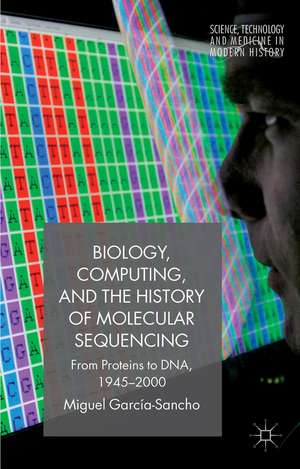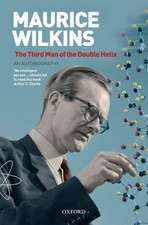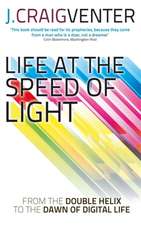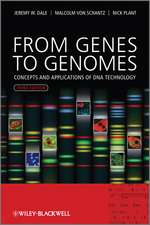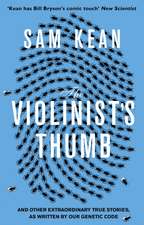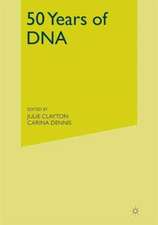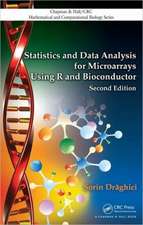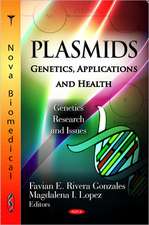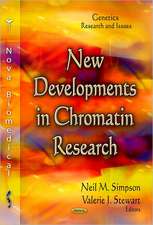Biology, Computing, and the History of Molecular Sequencing: From Proteins to DNA, 1945-2000: Science, Technology and Medicine in Modern History
Autor M. García-Sanchoen Limba Engleză Paperback – 11 mai 2012
| Toate formatele și edițiile | Preț | Express |
|---|---|---|
| Paperback (2) | 416.54 lei 6-8 săpt. | |
| Palgrave Macmillan UK – 2012 | 416.54 lei 6-8 săpt. | |
| Palgrave Macmillan UK – 11 mai 2012 | 416.54 lei 6-8 săpt. | |
| Hardback (1) | 421.93 lei 6-8 săpt. | |
| Palgrave Macmillan UK – 11 mai 2012 | 421.93 lei 6-8 săpt. |
Din seria Science, Technology and Medicine in Modern History
-
 Preț: 381.00 lei
Preț: 381.00 lei - 15%
 Preț: 696.50 lei
Preț: 696.50 lei - 5%
 Preț: 720.31 lei
Preț: 720.31 lei - 5%
 Preț: 369.65 lei
Preț: 369.65 lei - 15%
 Preț: 641.71 lei
Preț: 641.71 lei -
 Preț: 389.70 lei
Preț: 389.70 lei -
 Preț: 390.63 lei
Preț: 390.63 lei -
 Preț: 387.75 lei
Preț: 387.75 lei -
 Preț: 391.61 lei
Preț: 391.61 lei -
 Preț: 392.60 lei
Preț: 392.60 lei - 18%
 Preț: 898.13 lei
Preț: 898.13 lei -
 Preț: 386.81 lei
Preț: 386.81 lei -
 Preț: 223.95 lei
Preț: 223.95 lei -
 Preț: 397.01 lei
Preț: 397.01 lei -
 Preț: 395.85 lei
Preț: 395.85 lei -
 Preț: 391.61 lei
Preț: 391.61 lei -
 Preț: 384.48 lei
Preț: 384.48 lei - 15%
 Preț: 642.18 lei
Preț: 642.18 lei -
 Preț: 389.70 lei
Preț: 389.70 lei -
 Preț: 387.75 lei
Preț: 387.75 lei - 15%
 Preț: 642.18 lei
Preț: 642.18 lei -
 Preț: 449.74 lei
Preț: 449.74 lei - 15%
 Preț: 639.08 lei
Preț: 639.08 lei - 15%
 Preț: 647.40 lei
Preț: 647.40 lei - 15%
 Preț: 643.81 lei
Preț: 643.81 lei -
 Preț: 388.13 lei
Preț: 388.13 lei -

Preț: 416.54 lei
Nou
Puncte Express: 625
Preț estimativ în valută:
79.70€ • 83.22$ • 65.97£
79.70€ • 83.22$ • 65.97£
Carte tipărită la comandă
Livrare economică 05-19 aprilie
Preluare comenzi: 021 569.72.76
Specificații
ISBN-13: 9781137543325
ISBN-10: 1137543329
Pagini: 242
Ilustrații: XIII, 242 p.
Dimensiuni: 140 x 216 x 14 mm
Greutate: 0.3 kg
Ediția:2012
Editura: Palgrave Macmillan UK
Colecția Palgrave Macmillan
Seria Science, Technology and Medicine in Modern History
Locul publicării:London, United Kingdom
ISBN-10: 1137543329
Pagini: 242
Ilustrații: XIII, 242 p.
Dimensiuni: 140 x 216 x 14 mm
Greutate: 0.3 kg
Ediția:2012
Editura: Palgrave Macmillan UK
Colecția Palgrave Macmillan
Seria Science, Technology and Medicine in Modern History
Locul publicării:London, United Kingdom
Cuprins
Introduction: An Historical Approach to Sequencing PART I: EMERGENCE: FREDERICK SANGER'S PIONEERING TECHNIQUES (1943-1977) The Sequence of Insulin and the Configuration of a New Biochemical Form of Work (1943-1962) From Chemical Degradation to Biological Replication (1962-1977) PART II: MECHANISATION – 1: COMPUTING AND THE AUTOMATION OF SEQUENCE RECONSTRUCTION (1962-1987) Sequencing Software and the Shift in the Practice of Computation Sequence Databases and the Emergence of 'Information Engineers' PART III: MECHANISATION – 2: THE SEQUENCER AND THE AUTOMATION OF SEQUENCE CONSTRUCTION (1980-2000) A New Approach to Sequencing at Caltech The Commercialisation of the DNA Sequencer Conclusions: A Long History of Practices Appendix 1: Oral Histories Appendix 2: Archival Sources Notes Bibliography
Recenzii
"Overall, this book provides a detailed time line of the events from the earliest methodologies to the metagenomic sequencing standard of today, and is a useful resource for anyone interested in the historical angle of DNA sequencing. Highly recommended." - M.C. Pavao, Worcester State College, Choice
"...an invaluable, possibly even essential, addition to the bookshelf of anyone wishing to understand modern biology in all its facets...The author has done a masterful job of integrating information about the way in which different aspects of computer science...have contributed to the development of sequencing." - Neeraja Sankaran, British Journal for the History of Science, 46: 544
"...a revised dissertation, grounded in a remarkable variety of primary sources including corporate records and oral history interviews." - Ruth Schwatz Cowan, American Historical Review, June 2013: 827
"...a timely and informative history of molecular sequencing ... Overall, Garcia-Sancho's book provides a highly readable and insightful analysis of the history of molecular sequencing, one that should be appreciated for its broad synthesis of existing scholarship and its extensive use of historical documents.." - Doogab Yi, History and Philosophy of the Life Sciences
"Supported by an impressive archival and oral research, and by a thorough revision of the secondary literature of the field, García-Sancho´s book is a celebration of what the history of recentand contemporary science can achieve, and for years to come it will remain as an obliged reference not only for historians of science, but for sociologists and all those interested in the detailed development of the industrialized-information society." - Edna Suarez-Diaz, Dynamis
"...an invaluable, possibly even essential, addition to the bookshelf of anyone wishing to understand modern biology in all its facets...The author has done a masterful job of integrating information about the way in which different aspects of computer science...have contributed to the development of sequencing." - Neeraja Sankaran, British Journal for the History of Science, 46: 544
"...a revised dissertation, grounded in a remarkable variety of primary sources including corporate records and oral history interviews." - Ruth Schwatz Cowan, American Historical Review, June 2013: 827
"...a timely and informative history of molecular sequencing ... Overall, Garcia-Sancho's book provides a highly readable and insightful analysis of the history of molecular sequencing, one that should be appreciated for its broad synthesis of existing scholarship and its extensive use of historical documents.." - Doogab Yi, History and Philosophy of the Life Sciences
"Supported by an impressive archival and oral research, and by a thorough revision of the secondary literature of the field, García-Sancho´s book is a celebration of what the history of recentand contemporary science can achieve, and for years to come it will remain as an obliged reference not only for historians of science, but for sociologists and all those interested in the detailed development of the industrialized-information society." - Edna Suarez-Diaz, Dynamis
Notă biografică
Miguel Garcia-Sancho obtained his Ph.D. at Imperial College London, UK, and has worked at the University of Manchester and Spanish National Research Council (CSIC). He is currently a Chancellor's Fellow at the Department of Science, Technology and Innovation Studies of the University of Edinburgh. His interests lay in the history and social studies of twentieth century biomedicine, as well as science communication and free-lance scientific journalism.
